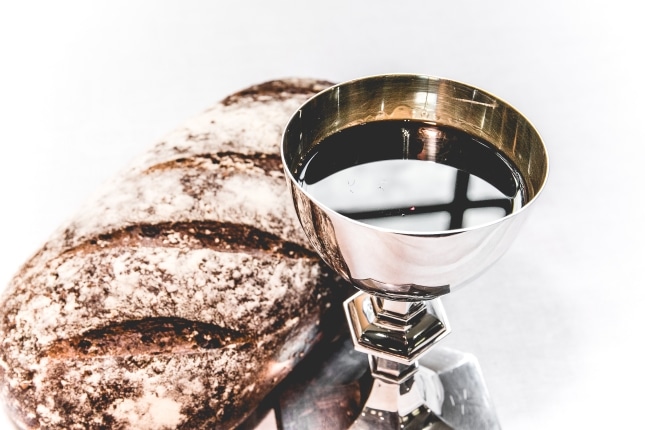
According to Roman Catholicism, the bread and wine of the communion meal become the actual flesh and blood of Jesus’ human body at the moment the priest blesses them during the Mass. This doctrine is known as “transubstantiation.” Roman Catholic’s sometimes defend this doctrine by appealing to 1 Corinthians 10:16:
“Is not the cup of blessing which we bless a sharing in the blood of Christ? Is not the bread which we break a sharing in the body of Christ?”
They understand this to mean that, after the bread and cup have been formally blessed, partaking of them must mean literally eating Jesus’ physical body. Ironically, that is exactly the opposite of what this text implies. Reading the passage more fully, it says:
“Therefore, my beloved, flee from idolatry. I speak as to wise men; you judge what I say. Is not the cup of blessing which we bless a sharing in the blood of Christ? Is not the bread which we break a sharing in the body of Christ? Since there is one bread, we who are many are one body; for we all partake of the one bread. Look at the nation Israel; are not those who eat the sacrifices sharers in the altar? What do I mean then? That a thing sacrificed to idols is anything, or that an idol is anything? No, but I say that the things which the Gentiles sacrifice, they sacrifice to demons and not to God; and I do not want you to become sharers in demons. You cannot drink the cup of the Lord and the cup of demons; you cannot partake of the table of the Lord and the table of demons. Or do we provoke the Lord to jealousy? We are not stronger than He, are we?” (1 Corinthians 10:14-22).
So, in the surrounding context of 1 Corinthians 10:16, Paul says that Christians share in Christ’s body and blood by eating the communion meal in the same way that an Israelite eating the meat of a sacrifice shares in the altar. Note, Paul does not say that we share in Christ’s body the way the Israelite shares in the lamb, but rather that we share in Christ’s body in the way that the Israelite shares in the altar. The meat the Israelite eats at home connects him to what happened on the altar, but the meat is not the altar. An Israelite does not go home and eat pieces of the altar. In this passage, Paul doesn’t compare the body of Christ to the sacrifice itself, which the Israelite eats, but to the altar, which the Israelite does not eat. Indeed, the altar is not literally present when the Israelite is eating. The Israelite shares in the altar by extension through eating the sacrifice, which is not itself the altar.
Paul goes on to speak of those who eat food sacrificed to idols (indeed, that’s who this passage is really addressing). Paul warns such men not to become “sharers in demons.” The issue is not sharing in the sacrifice, or even in the idol, but rather sharing in demons. The sacrifice is not in any sense the body of a demon. Neither is the idol. The passage is clear on this when it states, “What do I mean then? That a thing sacrificed to idols is anything, or that an idol is anything? No.” Those who participate in idolatrous feasts are not sharing in demons because the meat is actually part of the demon. The meat is nothing. Even the idol, the statue of a so-called god to which the meat is offered, is nothing. Yet, “the things which the Gentiles sacrifice, they sacrifice to demons and not to God; and I do not want you to become sharers in demons.” Behind the false pagan gods were real evil spirits deceiving the lost gentile nations. To participate in pagan sacrificial worship is to share in the demons who are the objects of that worship. The sacrifice and the idol are actually nothing. They represent, however, the reality of the demonic influence behind such idolatrous acts. Paul’s concern was over what eating meat that is publically dedicated to an idol might represent. His concern is not with what the meat actually is.
Clearly, then, when Paul speaks of “sharing in,” something, he does not mean “literally eating” it. What each of these examples has in common is that a person is sharing in one thing by eating something else that is not directly the thing in which the person is sharing. In the context of 1 Corinthians 10:16, “sharing in” is participation by extension, whether that be in the body and blood of Christ, in the holy altar, or in demons. In fact, this is the only way to make sense of Paul’s point! He is explaining how one can believe that meat offered to an idol is itself nothing, and yet how one can still say that a person ought not to eat such meat.
“You cannot drink the cup of the Lord and the cup of demons; you cannot partake of the table of the Lord and the table of demons,” (1 Corinthians 10:21).
When we actually follow Paul’s argument, it makes no sense if Paul is saying that the bread and cup are sacred because they are, in fact, the literal flesh and blood of Jesus’ human body. In that case, there is no comparison between sharing in Christ’s body by eating the actual flesh of that body and supposedly sharing in demons by eating animal flesh that is just animal flesh and has nothing to do with the actual demon. Paul’s point only follows if the bread and wine are not literally the physical flesh and blood of Jesus. Only then is there any real analogy to be made between the Lord’s Supper as the table of Christ and idolatry as the table of demons.






